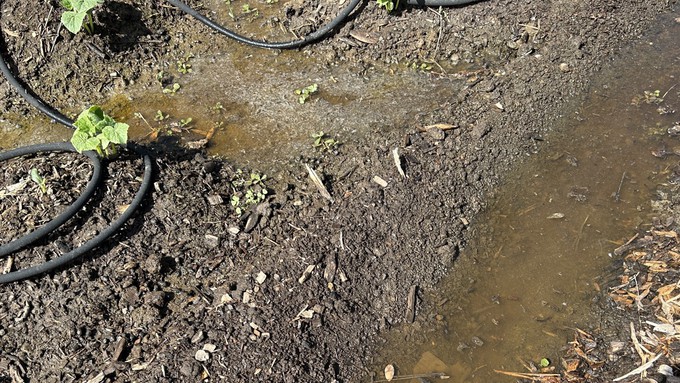
Don't make a home for disease-carrying pests; take precautions

Overwatering a vegetable garden can result in small ditches filled with standing water. Kathy Morrison
No matter the temperature, it’s time for long sleeves and pants – especially if you’re outside at dawn or dusk.
June is the start of mosquito season in Sacramento, and this week’s news is not good. The first mosquito sample of the season tested positive for West Nile Virus, a potentially deadly disease.
The Sacramento-Yolo Mosquito and Vector Control District took the sample in the city of Isleton. A second sample from Sacramento (zip code 95833) also tested positive.
“As we expected, the very warm weather we’ve had recently increased the number of mosquitoes and accelerated virus activity,” said district manager Gary Goodman in an official statement. “It’s important for residents to take these findings seriously and do everything they can to protect themselves.”
So far, four dead birds – two scrub jays, a magpie and a crow – in Sacramento County have tested positive for West Nile including two just before Memorial Day weekend. Those two were collected near Florin Road in south Sacramento in zip code 95828. The other dead birds were found in 95829 and 95833.
Last year in California, there were 225 confirmed human cases of West Nile, including 15 fatalities, says the district.
In response to the positive samples and dead birds, the district increased trapping and monitoring around Isleton and Sacramento in an effort to pinpoint where mosquitoes may be breeding. Targeted ground spraying may be used to quickly kill breeding adult mosquitoes.
Goodman urged residents to take proper precautions – including long sleeves and pants when mosquitoes are most active. And the use of insect repellent.
“Summer is around the corner and as more people enjoy outdoor activities it’s important to remember that the best protection against mosquito bites is an effective insect repellent,” said Goodman. Residents also are encouraged to report dead birds, neglected pools and other mosquito problems by calling the district hotline at 1-800-429-1022.
In the meantime, don’t give mosquitoes a place to call home. Empty any standing water that may have accumulated around your home in such spots as flower pots and saucers, kids’ toys or old tires. Make sure screens on doors and windows are snug.
Sacramento and Yolo county residents can receive email notifications of upcoming mosquito treatments for their neighborhoods. The listings are available by zip code.
To get on the mailing list as well as the latest mosquito news, go to www.FIGHTtheBITE.net.
Comments
0 comments have been posted.Sacramento Digs Gardening to your inbox.
Food in My Back Yard Series
May 6: Maintain soil moisture with mulch for garden success
April 29: What's (already) wrong with my tomato plants?
April 22: Should you stock up on fertilizer? (Yes!)
April 15: Grow culinary herbs in containers
April 8: When to plant summer vegetables
April 1: Don't be fooled by these garden myths
March 25: Fertilizer tips: How to 'feed' your vegetables for healthy growth
March 18: Time to give vegetable seedlings some more space
March 11: Ways to win the fight against weeds
March 4: Potatoes from the garden
Feb. 25: Plant a fruit tree now -- for later
Feb. 18: How to squeeze more food into less space
Feb. 11: When to plant? Consider staggering your transplants
Feb. 4: Starting in seed starting
Sites We Like
Garden Checklist for week of May 4
Enjoy this spring weather – and get gardening!
* Plant, plant, plant! It’s prime planting season in the Sacramento area. Time to set out those tomato transplants along with peppers and eggplants. Pinch off any flowers on new transplants to make them concentrate on establishing roots instead of setting premature fruit.
* Direct-seed melons, cucumbers, summer squash, corn, radishes, pumpkins and annual herbs such as basil.
* Harvest cabbage, lettuce, peas and green onions.
* In the flower garden, direct-seed sunflowers, cosmos, salvia, zinnias, marigolds, celosia and asters. (You also can transplant seedlings for many of the same flowers.)
* Plant dahlia tubers. Other perennials to set out include verbena, coreopsis, coneflower and astilbe.
* Transplant petunias, marigolds and perennial flowers such as astilbe, columbine, coneflowers, coreopsis, dahlias, rudbeckia and verbena.
* Keep an eye out for slugs, snails, earwigs and aphids that want to dine on tender new growth.
* Feed summer bloomers with a balanced fertilizer.
* For continued bloom, cut off spent flowers on roses as well as other flowering plants.
* Add mulch to the garden to maintain moisture. Mulch also cuts down on weeds. But don’t let it mound around the stems or trunks of trees or shrubs. Leave about a 6-inch to 1-foot circle to avoid crown rot or other problems.